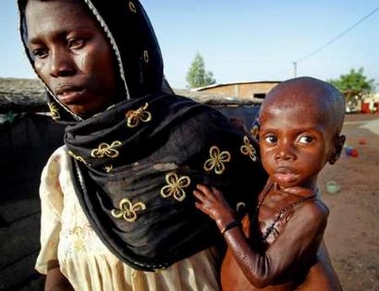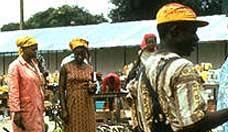
A year ago it was clear to me that Niger was headed for a major famine. The rains were a month late, the previous year’s harvest was meager and people were already on low food reserves when I visited my former Peace Corps village last summer in southern Niger.
RPCV Randy Brown writes that Niger crisis demands agressive international intervention
Niger crisis demands agressive international intervention
July 31, 2005
By Randy Brown
Caption: Caption: A mother carries her malnourished child into a feeding centre run by the medical charity Medecins Sans Frontiers in the town of Maradi in southern Niger July 1, 2005. International donors, including the European Union, ignored urgent calls for food aid for Niger, exposing thousands of children to the risk of dying of hunger, an official at a medical charity said on Friday. The situation in Niger highlights Africa's plight days ahead of next week's Group of Eight industrialised nations summit in Scotland, where Britain plans to put fighting poverty on the continent at the top of the agenda. Photo: REUTERS/Finbarr O'Reilly
Editor's note: Randy Brown of Middlesex is a former Peace Corps volunteer who spent time in Niger. His experience and reflections paint a somber picture of Niger's crisis and the humanitarian response.
A year ago it was clear to me that Niger was headed for a major famine. The rains were a month late, the previous year’s harvest was meager and people were already on low food reserves when I visited my former Peace Corps village last summer in southern Niger.
During the past few weeks I have had several conversations with friends in Niger, West Africa, describing the famine that has overtaken their country and the extreme measures that many families are being forced to resort to in order to survive.
In an e-mail my friend, Boubacar, says the small village where I once lived and worked as a Peace Corps volunteer was almost completely out of food. Some families had resorted to eating the seed grain they were supposed to use to plant their next crop, while others were realizing that if they went ahead and planted their remaining grain, they likely wouldn’t have the strength to bring in their next harvest. Boubacar said many families are so low on food that starvation is a foregone conclusion and that in some regions families are forced to choose which children they can feed.
Africa has been in the news more than usual during the past few weeks, with the Live 8 concert and the G-8 meeting drawing attention to debt relief and increased international aid. Indeed, Niger, deemed by the United Nations to be the world’s second poorest country (they used to be number one before the civil war in Sierra Leone bumped them) has been in the media recently due to the current scandal surrounding Karl Rove. Media coverage of the famine, however, has been practically nonexistent here in the United States.
Although this famine has been predicted for almost a full year, and some now believe it will be the second worst famine on record in this landlocked desert country, the United Nations states that there has been almost no international response. Back-to-back years of poor harvests and a major locust infestation have left most of the country completely out of food. Although the short rainy season has begun, the population is at best two months away from its next harvest.
In Niger, almost everyone is a subsistence farmer, which means that people plant and harvest just enough food to carry them through the next harvest. Most of the country is raw Sahara desert, and the roughly 12 million people that live in Niger are huddled along the country’s southern border with Nigeria, in the only part of the country that receives enough rainfall for cultivation (most of the time). This is a tough place to eke out an existence, even in good times.
The pristine landscape of the Sahara is alluring, but the cruel realities of subsistence in this part of the world should not be romanticized. Almost every person in Niger today has a personal understanding of hunger. If you are a subsistence farmer, you need to carefully store the bounty of your harvest so that it will last you an entire year. Usually it is not too difficult to harvest enough food for six or eight months, but harvesting 12 months of food is very difficult. Many people fall short, running low in the final months leading up to the next harvest. So people are used to lean times. They forage in the African bush for what I call "hunger foods": plants that are perhaps edible but that no one would seek out unless they were desperate.
The people have songs and fables about how to find and prepare such "foods," preparing the next generation for food shortages. For example, the seedpods of the Gigille tree, which resemble big green apples, are often collected in the bush when grain supplies run low. Once the seedpods are gathered they are soaked a brine of water and ashes for three days before the bitterness of the chalky seedpods goes away and they can even be eaten. People often joke with their neighbors, claiming that their granaries are full of gigille seeds. The laughter this brings hides the raw pain that accompanies the mutual food insecurity.
During a recent trip to Niger I felt like red lights were flashing all around me screaming "population crash." My former village felt crowded with children, and some older members of the village expressed their concern as well, recalling previous famines. Some men take two or three wives, and the average Nigerian mother gives birth to eight children, so it is not surprising that Niger has one of the world’s highest growth rates. Ironically, Niger also has one of the world’s highest infant mortality rates (260 per 1,000 births), so having several wives and lots of children was historically a survival strategy.
Today Niger has a marginal health care infrastructure, and the infant mortality rate is lower than it was in the past. But given the carrying capacity of the land, Niger is one of the most overpopulated places on Earth. During Niger’s last major drought in 1973, the country’s population hovered at 7 million, and people barely survived. Today, with almost 12 million people, a major population "correction" may be inevitable.
Yet despite the current famine, the past few years have been especially stable for Niger. The current president, Tandja Mamadou, won a free and fair re-election this past fall. In a part of the world where military coups are the more common steps to power, this marked the first time that a democratically elected president was able to serve an entire term in office. In fact, President Mamadou was at the White House three weeks ago and received commendations by President Bush, touting his administration’s new Millennium Challenge Account that he believes will help some African countries.
As the recent Live-8 concert and the G-8 meetings fade from memory, Nigerian officials have expressed frustration at the international community’s failure to respond proactively to their current food crisis, emphasizing that warnings about grain shortfalls have been known for many months. (The United Nations launched a flash appeal for $18.3 million in mid-May, but as of last week an official at the UN Office for the Coordination of Humanitarian Affairs said only $2.7 million, or 15 percent, had been received.)
If the Live-8 and G-8 goals of "ending poverty" are ever going to be realized, then the international community must move beyond acting only when a region is in full-scale crisis.
A response needs to come before the photographs of starving children make their way to the evening news shows, because by then it is too late to respond.
Randy Brown is a physics teacher and stonemason living in Middlesex. He is currently working with the Old Meeting House in East Montpelier on a fund-raiser for famine relief in Niger. Contributions can be sent to: Old Meeting House – Niger Hunger Project 1300 Center Rd., Montpelier, VT 05602. All donations will go directly to the purchase of food.











